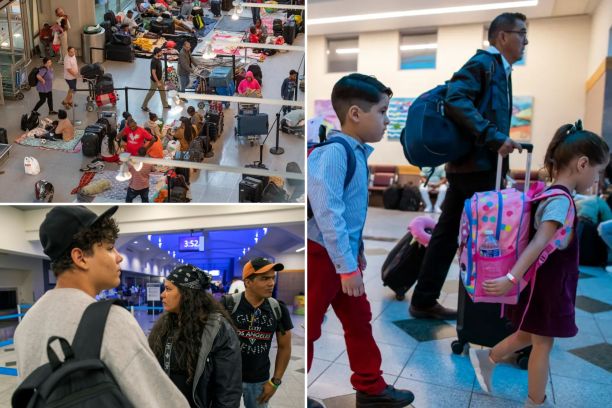Mayorkas Pretends to Cap ‘Parole’ Migration Before Election; House Republican Doubts Harris-Biden Tweak to Migrant Parole Program Will Lead to Deportations: ’Optics-driven smokescreen’
Mayorkas Pretends to Cap ‘Parole’ Migration Before Election:
President Joe Biden’s Homeland Security chief is now refusing to send home the more than 500,000 foreign workers he has imported via a “humanitarian” parole program that was supposedly limited to two years.
Instead of being sent home at the end of their two-year visas, the 530,000 economic migrants are being invited to use the many loopholes, exemptions, and lawsuits in migration law to stay working in the United States.
When they do stay, they will continue to make Americans poorer by minimizing pressure on employers to hire Americans at decent wages or to invest in wage-boosting workplace technology — while also extending their separation from their at-home families.
The policy change “gives the Biden administration the appearance that they’re looking tough when really they’re just doing the same things that they’ve been doing all along,” one critic told Breitbart News. He added:
It’s a very cynical move by the administration because it goes against everything that they’ve said in public that they support in an immigration system and it shows that these individuals are treated as nothing more than an [economic] commodity, not as individuals.
Friendly media outlets are helping by portraying the decision as a popular curb on migrants. For example, the headline at CBS News claimed, “U.S. won’t extend legal status for 530,000 migrants who arrived under Biden program.”
“Another optics smokescreen from Biden & Harris,” said a tweet from the GOP-led House Committee on Homeland Security. “There are numerous other ways they could be allowed to stay.”
Since January, Biden’s pro-migration border chief, Alejandro Mayorkas, has taken several steps before the election to reduce the chaos at the border. But those steps still quietly invite many economic migrants to cross the border — and can be easily reversed if Donald Trump is defeated in November. For example, Mayorkas is still welcoming roughly 1,000 new Cuban, Haitian, Nicaraguan, and Venezuelan job-seekers each day, after a brief hiatus in the program to curb endemic cheating and labor smuggling. —>READ MORE HERE
House Republican doubts Harris-Biden tweak to migrant parole program will lead to deportations: ’Optics-driven smokescreen’:
A top House Republican dismissed the significance of the Harris-Biden administration’s Friday tweak to a migrant parole program, barring more than 500,000 migrants from four nations from extending their temporary legal status.
The change, announced by the US Citizenship and Immigration Services, will force migrants from Cuba, Haiti, Nicaragua and Venezuela enrolled in the program to self deport or face removal proceedings after their two-year parole terms expire.
However, some will be able to remain in the US by simply enrolling in different federal programs offering legal status – leading to doubts about the consequences of the sudden change.
“This move is yet another optics-driven smokescreen from the Biden-Harris administration,” Rep. Mark Green (R-Tenn.), the chairman of the House Homeland Security Committee, told The Post.
“There are numerous other ways these inadmissible aliens could be — and likely will be — allowed to stay, including through applying for asylum or Temporary Protected Status,” the congressman said. “Even if they don’t, however, given ICE’s low enforcement rates under this administration, most simply will not be priorities for removal.”
Under the controversial mass parole program, migrants from Cuba, Haiti, Nicaragua and Venezuela (CHNV) who meet certain criteria have been allowed to fly into US ports of entry, where they receive work permits and authorization to remain in the country for two years.
Until Friday, migrants could apply to extend their parole terms.
“As initially stated in the Federal Register notices, a grant of parole under these processes was for a temporary period of up to two years,” a US Citizenship and Immigration Services spokesperson said in a statement. —>READ MORE HERE







Comments are closed.